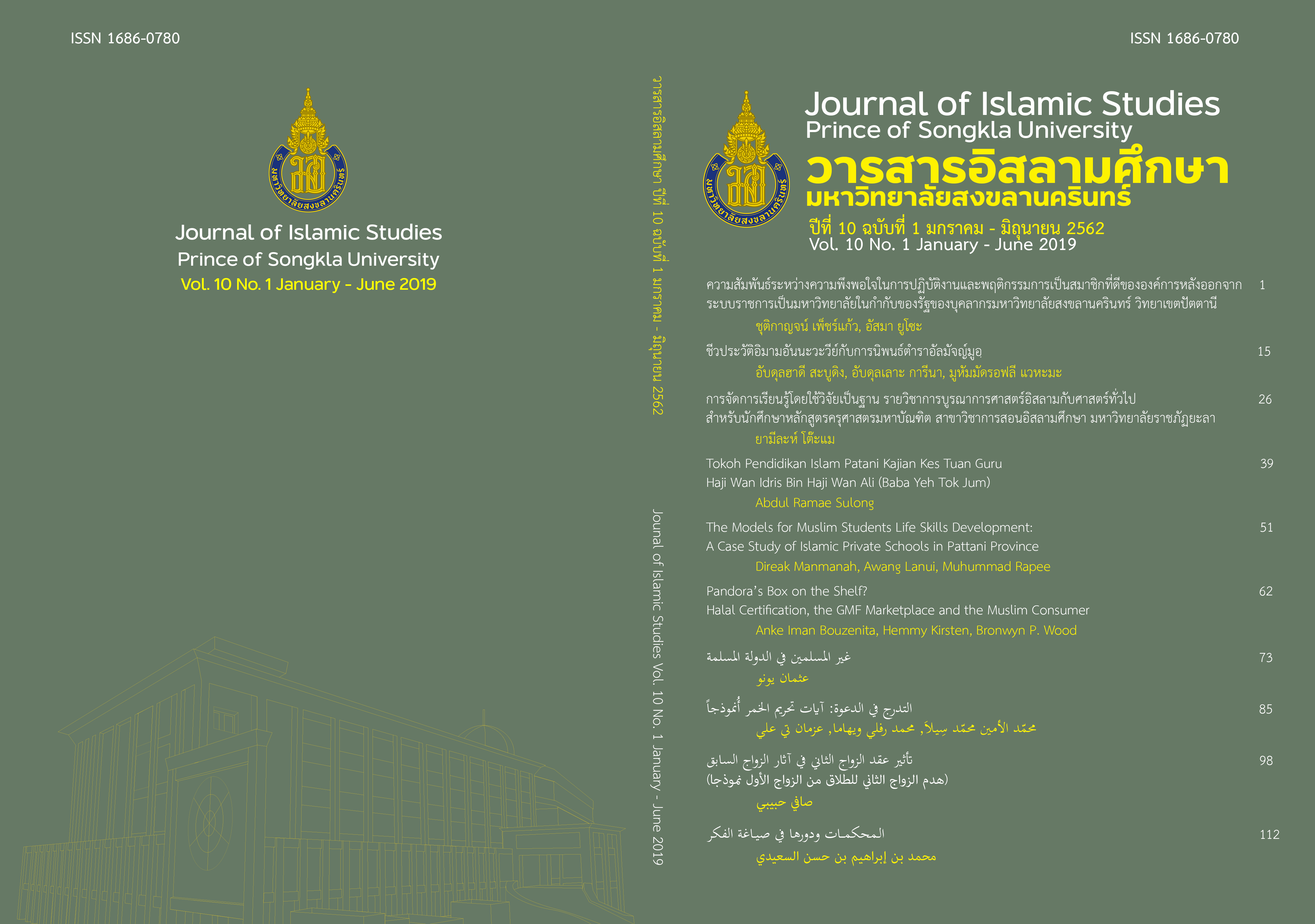It Raised the Second Marriage Took Place in the Effects of the Previous Marriage (Divorce is Calculated from the First Marriage after the Second Marriage Model)
Keywords:
Jurisprudence, Law, Demolition, Divorce, Personal Status, FamilyAbstract
The divorce of a married woman from her husband and leaving him for a couple of months till the expiry of the Iddah period (waiting period allocated after the death of husband or after a divorce) has a number of implications. If this divorce was not a permanently irrevocable one - according to Islamic legislation -, that is the husband has issued only one or two divorces to his wife, and in the meanwhile the divorced woman married another man, and their relationship ends - in turn - with divorce or death; in such case, is it unacceptable for her to return to her first husband due to the previous divorce that preceded the marriage of the woman from the second man, or does the second marriage abolish the previous divorce? In fact, this subject had generated an old dispute among the Companions of the Prophet Muhammad (peace and blessings of Allaah be upon him), the Tābi'un (followers) and the scholars of the four Sunni schools of law (Madhabs). The disagreement comes as a result to the fact that there is no clear text about such an issue on the one hand, and the possible existence of certain disputed evidences on the other hand. In an attempt to clarify the subject and review the statements and evidence of Islamic jurists as well as the adherents of law reasoning, this research seeks to compare and contrast the sayings of jurists according to the foundational goals (maqasid al-Shariah). Still, bringing the heated debate into an end is not possible in such matters, considering that the dispute is long-lasting and the issue dates back to the early times of Islam and was one of the subjects that generated controversy among Muslims of the first generation. In order to deal with this issue, this research will be divided into an introduction and two sections. The first section deals with the statements and evidence of those who adopt the attitude that the second marriage does not demolish the previous divorce issued by the first husband. The second section, however, analyses the statements of those who tend to say that the second marriage both abolishes and obliterates the effects of the first one, with the mention of their evidences and reactions. The study will include the opinion of jurists about this issue, and conclude with the most important findings reached.
References
الحسين بن مسعود البغوي، شرح السنة؛ تحقيق: شعيب الأرنؤوط- محمد زهير الشاويش؛ نشر: المكتب الإسلامي - دمشق، بيروت؛ الطبعة: الثانية، (1403هـ - 1983م).
وهبة بن مصطفى الزحيلي، التفسير المنير في العقيدة والشريعة والمنهج، دار الفكر المعاصر – دمشق، الطبعة : الثانية ، 1418 هـ.
يوسف بن عبد البر النمري القرطبي ، الاستذكار، تحقيق: سالم محمد عطا، محمد علي معوض، دار الكتب العلمية – بيروت، الطبعة: الأولى، (1421 هـ– 2000م).
كمال الدين محمد ابن الهمام، فتح القدير، دار الفكر، بدون طبعة وبدون تاريخ.
مالك بن أنس، م، الموطأ؛ تعليق: محمد فؤاد عبد الباقي؛ دار إحياء التراث العربي، بيروت – لبنان، ( 1985 م)،.
مجد الدين أبو السعادات ابن الأثير، الشّافي في شرح مسند الشّافعي، تحقيق: أحمد بن سليمان - يَاسر بن إبراهيم، نشر: مَكتَبةَ الرُّشْدِ، الرياض - المملكة العربية السعودية، الطبعة: الأولى.
موفق الدين عبد الله بن قدامة، المغني ، نشر: مكتبة القاهرة، الطبعة: دون طبعة.
محمد بن عبد الباقي الزرقاني، شرح الزرقاني على موطأ الإمام مالك، تحقيق: طه عبد الرءوف سعد، نشر: مكتبة الثقافة الدينية – القاهرة، الطبعة: الأولى، 1424هـ - 2003م.
محمد بن علي الشوكاني، السيل الجرار المتدفق على حدائق الأزهار،نشر: دار ابن حزم، الطبعة الأولى، (بدون تاريخ).
محيي الدين يحيى بن شرف النووي، تهذيب الأسماء واللغات، دار الكتب العلمية، بيروت – لبنان، (بدون تاريخ).
سليمان بن خلف الباجي أبو الوليد، المنتقى شرح الموطإ، مطبعة السعادة - بجوار محافظة مصر، الطبعة: الأولى، (1332 هـ).
عبد الوهاب بن علي المالكي، المعونة على مذهب عالم المدينة «الإمام مالك بن أنس»، تحقيق: حميش عبد الحقّ، نشر: المكتبة التجارية، مصطفى أحمد الباز - مكة المكرمة، (رسالة دكتوراه بجامعة أم القرى بمكة المكرمـة).
عبد الوهاب بن علي بن نصر، الإشراف على نكت مسائل الخلاف، تحقيق: الحبيب بن طاهر، دار ابن حزم، الطبعة: الأولى، (1420هـ - 1999م).
علي بن حزم الأندلسي، المحلى بالآثار، دار الفكر – بيروت، الطبعة: دون طبعة، (بدون تاريخ).
علي بن الحسن ابن عساكر، تاريخ دمشق، تحقيق: عمرو بن غرامة العمروي، دار الفكر للطباعة والنشر والتوزيع، (1415 هـ - 1995 م) .
عمر بن إسحق الغزنوي، الغرة المنيفة في تحقيق بعض مسائل الإمام أبي حنيفة، سراج الدين، أبو حفص الحنفي، النشر: مؤسسة الكتب الثقافية، الطبعة: الأولى، (1406-1986ـ).
القانون الاتحادي لدولة الإمارات العربية المتحدة بشأن الأحوال الشخصية سنة 2005.
قانون الأحوال الشخصية الأردني.
قانون الأحوال الشخصية السوري سنة 1953.
القانون الكويتي رقم 51 لسنة 1984 في شأن الأحوال الشخصية (51 / 1984)
شمس الدين أحمد ابن خلكان،وفيات الأعيان وأنباء أبناء الزمان، تحقيق: إحسان عباس، دار صادر – بيروت، (بدون تاريخ).
شمس الدين محمد الذهبي، تذكرة الحفاظ، دار الكتب العلمية بيروت-لبنان، الطبعة: الأولى، (1419هـ- 1998م).
Downloads
Published
How to Cite
Issue
Section
License
Copyright (c) 2019 Journal of Islamic Studies, College of Islamic Studies, Prince of Songkla University, Pattani Campus

This work is licensed under a Creative Commons Attribution 4.0 International License.
All articles Published in The Journal of Islamic Studies are author’s opinions, and not the responsibility of the Faculty of Islamic Sciences nor the editorial board. However any citation should be referred to the journal.
















